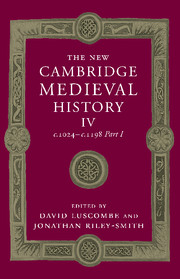Book contents
- Frontmatter
- 1 Introduction
- 2 The Rural Economy and Demographic Growth
- 3 Towns and the Growth of Trade
- 4 Government and Community
- 5 The Development of Law
- 6 Knightly Society
- 7 War, Peace and the Christian Order
- 8 The Structure of the Church, 1024–1073
- 9 Reform and the Church, 1073–1122
- 10 Religious Communities, 1024–1215
- 11 The Institutions of the Church, 1073–1216
- 12 Thought and Learning
- 13 Religion and the Laity
- 14 The Crusades, 1095–1198
- 15 The Eastern Churches
- 16 Muslim Spain and Portugal: Al-Andalus and its Neighbours
- 17 The Jews in Europe and the Mediterranean Basin
- 18 Latin and Vernacular Literature
- 19 Architecture and the Visual Arts
- List of Primary Sources
- Bibliography of secondary works arranged by chapter
- Index
- Frontispiece">
- Plate section"
- References
4 - Government and Community
Published online by Cambridge University Press: 28 March 2008
- Frontmatter
- 1 Introduction
- 2 The Rural Economy and Demographic Growth
- 3 Towns and the Growth of Trade
- 4 Government and Community
- 5 The Development of Law
- 6 Knightly Society
- 7 War, Peace and the Christian Order
- 8 The Structure of the Church, 1024–1073
- 9 Reform and the Church, 1073–1122
- 10 Religious Communities, 1024–1215
- 11 The Institutions of the Church, 1073–1216
- 12 Thought and Learning
- 13 Religion and the Laity
- 14 The Crusades, 1095–1198
- 15 The Eastern Churches
- 16 Muslim Spain and Portugal: Al-Andalus and its Neighbours
- 17 The Jews in Europe and the Mediterranean Basin
- 18 Latin and Vernacular Literature
- 19 Architecture and the Visual Arts
- List of Primary Sources
- Bibliography of secondary works arranged by chapter
- Index
- Frontispiece">
- Plate section"
- References
Summary
A good many historians of this period prefer to use the word lordship rather than government. The reason may be that, whereas government suggests an impersonal and public authority, lordship implies the more personal and less public kind of political power that is often held to have characterised the eleventh century, if not the twelfth as well. The typical ruler of the time, according to this view, was the ‘feudal lord’, whose authority over his free or noble subjects was founded on the personal and voluntary contract of vassalage, and whose authority over peasants was founded on his proprietary rights over their holdings. Such collective activities as are envisaged in this world of essentially personal relationships were to be found chiefly among peasants and townspeople. Before the ‘communal movement’ of the twelfth century, however, even they did not form communities of any great solidarity. When popular solidarity developed it is often thought to have been soon, if not immediately, directed at securing a measure of collective independence from lords: lordship and community were thus essentially opposed to each other. It is the contention of this chapter that these views of government and community in the eleventh and twelfth centuries are inadequate. On the one hand, government was something more than personal lordship: the belief in the absence of any general sense of public welfare and public responsibility seems to rest on nothing but old stereotypes of feudal society. Once any lord had exercised political control fairly effectively over an area for some time, his authority was legitimised by prevailing ideas about custom, lawful subjection and good order.
Keywords
- Type
- Chapter
- Information
- The New Cambridge Medieval History , pp. 86 - 112Publisher: Cambridge University PressPrint publication year: 2004
References
- 1
- Cited by

